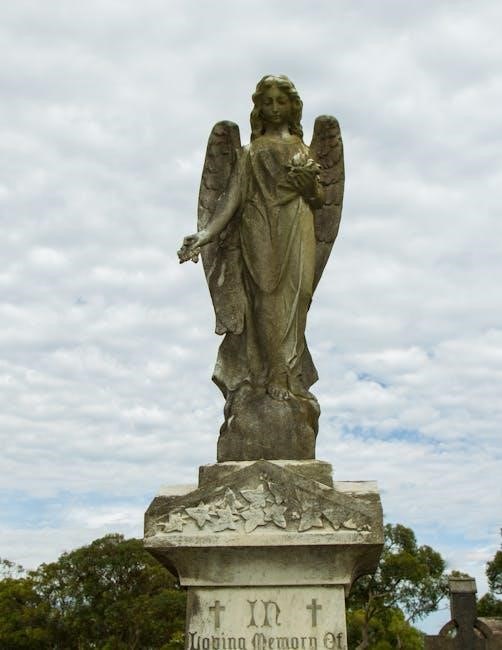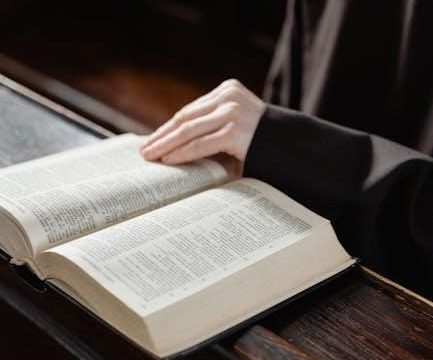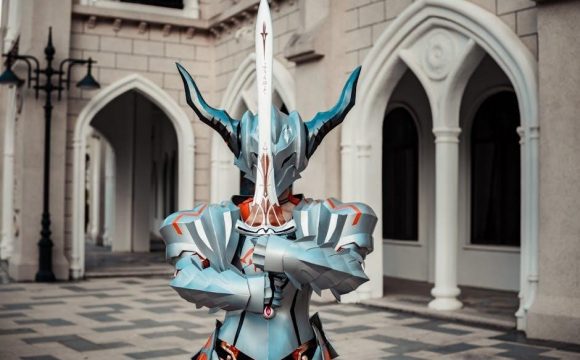Heaven Officials’ Blessing, a captivating novel by Mo Xiang Tong Xiu, blends mythology, romance, and divine conflicts. It follows the Crown Prince’s ascension to godhood and Hua Cheng’s fiery rebellion against temples, exploring themes of virtue, banishment, and celestial ceremonies, set in the mystical Kingdom of Xianle.
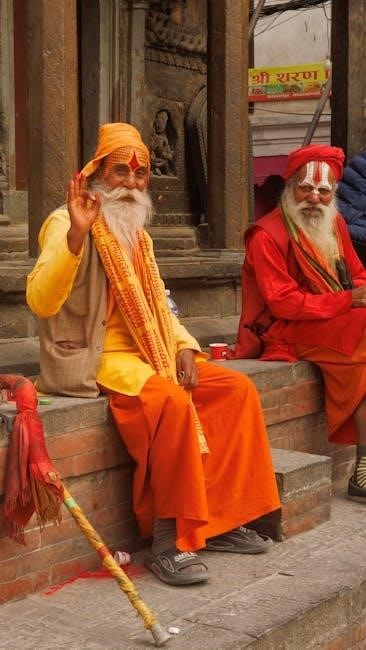
1.1 Overview of the Novel
Heaven Officials’ Blessing, written by Mo Xiang Tong Xiu, is a captivating novel that intertwines mythology, romance, and divine conflicts. The story revolves around the Crown Prince’s ascension to godhood and his journey through celestial hierarchies. Set in the mystical Kingdom of Xianle, the narrative explores themes of virtue, sacrifice, and divine judgment. Key events include the Shangyuan Heavenly Ceremonial Procession and Hua Cheng’s rebellion against the gods, which unfolds into a tale of destruction and redemption. The novel seamlessly blends historical and supernatural elements, creating a unique and immersive reading experience for fans of mythological fiction.
1.2 Genre and Themes
Heaven Officials’ Blessing is a fantasy novel with elements of romance, mythology, and divine politics. It explores themes of justice, sacrifice, and redemption, emphasizing the Crown Prince’s virtues and the consequences of divine judgment. The story delves into the struggle between good and evil, highlighting the complexities of celestial power and moral accountability. Symbolic elements, such as the sword and flower, represent the prince’s dual nature—strength and compassion. The novel’s intricate world-building and emotional depth make it a compelling read for fans of mythological and supernatural fiction, blending tradition with modern storytelling techniques.
1.3 Cultural Significance
Heaven Officials’ Blessing holds profound cultural significance, blending Chinese mythology with modern storytelling. The novel draws heavily from religious and ceremonial traditions, such as the Shangyuan Heavenly Procession, and explores themes of divine judgment and redemption. Its vivid portrayal of celestial bureaucracy and mythological creatures resonates deeply with readers familiar with Asian cultural motifs. The story’s emphasis on moral accountability and the consequences of divine power reflects timeless philosophical questions. By weaving these elements into a compelling narrative, Mo Xiang Tong Xiu has created a work that not only entertains but also preserves and reimagines cultural heritage for a new generation.
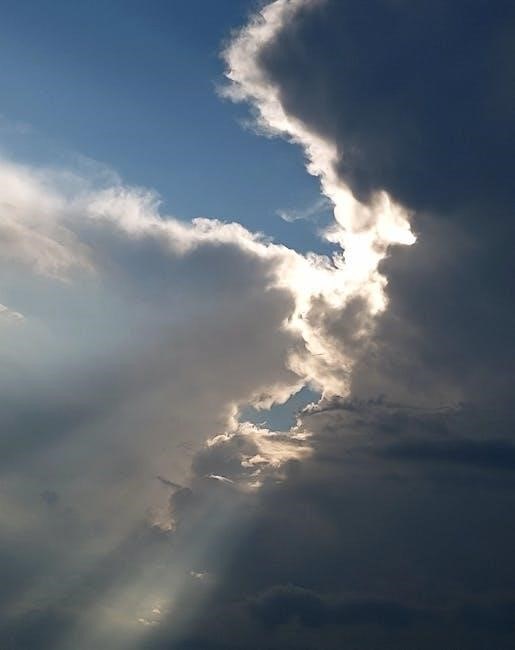
Background and Setting of the Novel
The story unfolds in the ancient Kingdom of Xianle, where divine and mortal realms intersect. The Crown Prince’s ascension to godhood and Hua Cheng’s temple-burning rebellion shape the narrative.
2.1 The Kingdom of Xianle
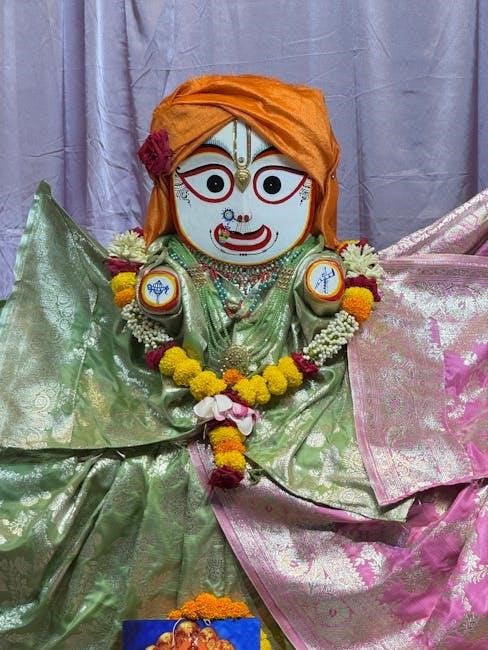
The Kingdom of Xianle is an ancient, prosperous land deeply rooted in tradition and spirituality. Its sprawling landscapes, from misty mountains to serene rivers, create a backdrop of divine and mortal coexistence. The kingdom serves as a bridge between the heavenly and earthly realms, with its capital, Xianle City, being a hub of vibrant culture and religious devotion. Temples and shrines dot the land, reflecting the people’s reverence for deities. This setting is central to the novel’s exploration of faith, power, and the intertwined fates of gods and mortals. The kingdom’s unique charm captivates readers, immersing them in its mystical world.
2.2 The Role of Heavenly Officials
Heavenly Officials in the novel serve as divine emissaries, governing the mortal realm and maintaining cosmic order. They are tasked with resolving earthly conflicts, enforcing heavenly decrees, and guiding mortal souls. These officials are chosen for their virtue and wisdom, often ascending to their roles after proving their worth. Their influence is profound, shaping the lives of mortals and gods alike. The novel highlights their dual role as enforcers of justice and compassionate guides, illustrating the delicate balance between divine authority and mortal free will. Their actions drive the plot, weaving a tapestry of fate and redemption.
2.3 The Shangyuan Heavenly Ceremonial Procession
The Shangyuan Heavenly Ceremonial Procession is a grand divine event in Heaven Officials’ Blessing, marking the ascent of mortal souls to the heavens. Held once every ten years, it symbolizes the connection between the mortal and celestial realms. The procession is a spectacle of divine authority, with Heavenly Officials leading the ceremony to ensure the proper transfer of souls. It is a time of both celebration and solemnity, reflecting the novel’s themes of fate and redemption. The event also plays a pivotal role in the story, influencing the protagonist’s journey and the unfolding of divine decrees.
Main Characters and Their Roles
The Crown Prince ascends to godhood, the Ghost King rules with mysterious power, and Hua Cheng navigates fate amidst celestial turmoil, shaping the divine narrative.

3.1 Crown Prince and His Ascension to Godhood
The Crown Prince embarks on a divine journey, showcasing his unwavering determination and purity of heart. His ascension to godhood is marked by trials and celestial tribulations, highlighting his resilience and moral integrity. As a central figure, he exemplifies the virtues of compassion and justice, earning reverence from both mortals and heavenly beings. His transformation symbolizes the harmony between human and divine realms, making his ascension a pivotal moment in the novel’s narrative.
3.2 The Ghost King and Puqi Shrine
The Ghost King, a mysterious and enigmatic figure, plays a pivotal role in the novel, often shrouded in solitude and secrecy. His association with the Puqi Shrine underscores his connection to the mortal realm, serving as a refuge and a symbol of his enduring influence. The shrine itself becomes a focal point, representing both solace and the weight of divine responsibilities. Through his interactions with the Crown Prince, the Ghost King’s nature is revealed, blending elements of tragedy and profound wisdom. His presence enriches the narrative, adding layers of complexity to the story’s divine and mortal dynamics.
3.3 Hua Cheng and the Burning of Temples
Hua Cheng, a central figure in the novel, is known for his fiery and unpredictable nature. His actions, particularly the burning of temples, highlight his defiance and rebellion against the divine order. This event serves as a turning point, showcasing his deep-seated frustrations and his unique perspective on the world; Through his character, the novel explores themes of rebellion, free will, and the consequences of challenging authority. Hua Cheng’s antics add a layer of tension and unpredictability, making him one of the most compelling and complex characters in the story.
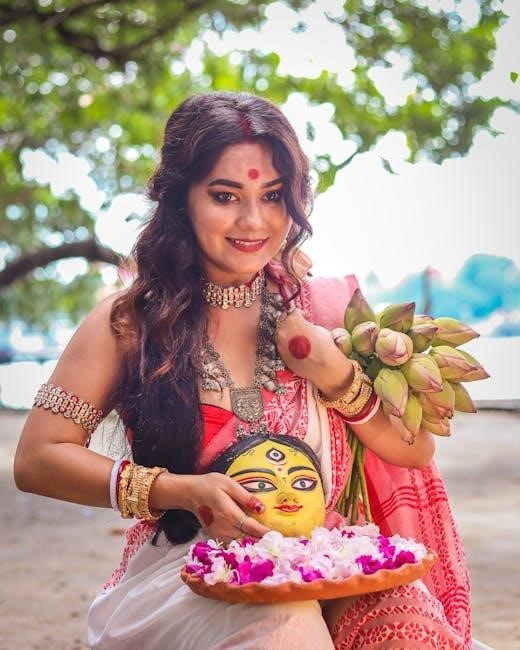
Key Themes and Symbolism
The novel explores themes of divine justice, redemption, and the duality of human nature. Symbolism, such as the sword and flower, reflects the Crown Prince’s dual identity.
4.1 The Virtues of the Crown Prince
The Crown Prince embodies exceptional virtues, showcasing unwavering integrity, kindness, and a steadfast commitment to justice. His ascension to godhood highlights his moral purity and selflessness. With a deep sense of responsibility, he prioritizes the welfare of others, even when faced with adversity. His compassion and empathy resonate throughout the story, inspiring those around him. The Crown Prince’s virtues serve as a moral compass, guiding the narrative and exemplifying the ideals of divine leadership. His character underscores the importance of righteousness and humility, making him a beloved and revered figure in the novel.
4.2 The Symbolism of the Sword and Flower
The sword and flower in Heaven Officials’ Blessing hold profound symbolic meanings. The sword represents strength, justice, and the harsh realities of conflict, often tied to the Crown Prince’s divine duties. In contrast, the flower symbolizes beauty, purity, and the delicate balance between life and death. Together, they embody the duality of power and grace, reflecting the novel’s exploration of contrasts—light and darkness, divine and mortal. These symbols enrich the narrative, offering layers of interpretation that resonate with the story’s themes of sacrifice and redemption.
4.3 The Consequences of Banishment
Banishment in Heaven Officials’ Blessing carries severe repercussions, both spiritual and emotional. The Crown Prince, once a revered deity, is stripped of his divine status and immortality, forcing him to navigate the mortal realm. This exile isolates him from heavenly authorities and burdens him with human vulnerabilities. The novel portrays banishment as a double-edged sword: while it allows for personal growth, it also severs ties to his former life and ignites feelings of loneliness and abandonment. This theme underscores the sacrifices required for redemption and the resilience needed to overcome divine judgment.

The Author’s Influence and Style
Mo Xiang Tong Xiu’s unique writing style blends mythology with romance, creating immersive worlds. Her lyrical prose and deep character exploration captivate readers globally.
5.1 Mo Xiang Tong Xiu’s Writing Style
Mo Xiang Tong Xiu’s writing style is renowned for its intricate world-building and emotional depth; Her prose is lyrical, weaving together mythology and modern sensibilities seamlessly. In Heaven Officials’ Blessing, she masterfully crafts complex characters, exploring their motivations and relationships with precision. Her ability to balance humor, tragedy, and romance creates a captivating narrative. The author’s use of metaphors and symbolic elements adds layers of meaning, making her work both intellectually stimulating and emotionally resonant. This unique blend has endeared her to readers worldwide, solidifying her reputation as a visionary in contemporary Chinese literature.
5.2 The Blend of Mythology and Fiction
In Heaven Officials’ Blessing, Mo Xiang Tong Xiu masterfully blends traditional mythology with original fiction. The novel is set in a celestial realm, drawing inspiration from Chinese mythological concepts of gods, spirits, and heavenly bureaucracies. However, the story diverges from strict mythological narratives, incorporating creative plot twists and character dynamics. This fusion allows the novel to honor cultural heritage while offering fresh, imaginative storytelling. By weaving familiar mythological elements with innovative fiction, the author creates a unique and engaging world that appeals to both fans of mythology and lovers of original tales.
5.3 The Use of Ceremonial and Religious Elements
Mo Xiang Tong Xiu intricately weaves ceremonial and religious elements into Heaven Officials’ Blessing, creating a rich, immersive world. The novel prominently features sacred rituals, divine statues, and heavenly ceremonies, which are deeply rooted in the story’s cultural and religious framework. These elements not only enhance the narrative but also serve as symbols of the characters’ spiritual journeys. The author’s meticulous attention to detail in depicting these aspects adds authenticity and depth, making the celestial bureaucracy and its traditions feel both familiar and fantastical. This blend of ceremony and spirituality enriches the novel’s unique charm.

Cultural and Religious References
Heaven Officials’ Blessing seamlessly integrates traditional Chinese cultural and religious elements, drawing inspiration from mythology, folklore, and spiritual practices. The novel’s narrative is enriched by these references.
6.1 The Role of Temples and Shrines
Temples and shrines in Heaven Officials’ Blessing serve as central hubs for spiritual and cultural practices, bridging the mortal and divine realms. These sacred spaces are often settings for key rituals, ceremonies, and divine interventions. The Puqi Shrine, managed by the Ghost King, exemplifies this, showcasing the intricate relationship between mortals and heavenly officials. Temples also symbolize faith, redemption, and the pursuit of enlightenment, reflecting the novel’s deep-rooted cultural and religious influences. Their prominence highlights the importance of spirituality in shaping the story’s world and its characters’ journeys.
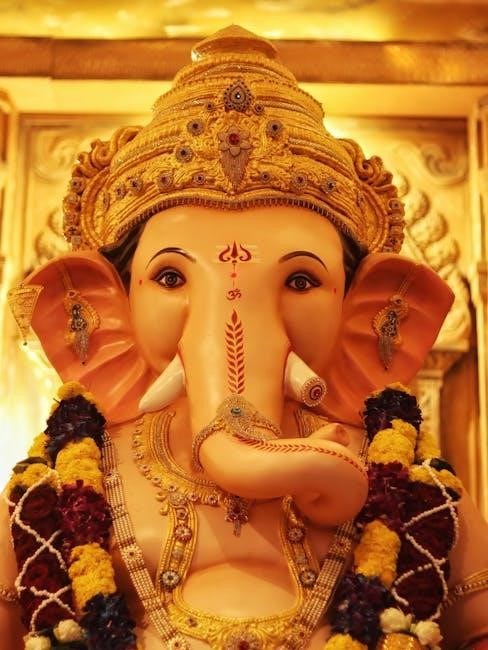
6.2 The Significance of the Heavenly Ceremonial Procession
The Heavenly Ceremonial Procession is a pivotal event in Heaven Officials’ Blessing, symbolizing the connection between the mortal and divine realms. It is a grand ritual honoring the gods and ancestors, showcasing the harmony between heaven and earth. The procession highlights the Crown Prince’s divine role and his journey toward ascension, emphasizing his commitment to maintaining cosmic balance. This ceremony also underscores the novel’s themes of faith, redemption, and the interplay of mortal and celestial forces, making it a cornerstone of the story’s cultural and religious tapestry.
6.3 The Impact of Divine Statues
In Heaven Officials’ Blessing, divine statues are revered symbols of celestial authority and spiritual connection. They embody the divine presence, serving as intermediaries between mortals and gods. These statues are often central to rituals and ceremonies, amplifying prayers and blessings. Their destruction or desecration is seen as a grave offense, reflecting the delicate balance between mortal reverence and divine favor. The novel uses these statues to explore themes of faith, power, and the consequences of disrespecting sacred entities, deepening the narrative’s religious and cultural layers.

The Novel’s Reception and Popularity
Heaven Officials’ Blessing has garnered widespread acclaim for its intricate storytelling and emotional depth, resonating deeply with readers worldwide and solidifying its place as a modern classic.
7.1 Reviews and Reader Feedback
Readers have praised Heaven Officials’ Blessing for its unique storytelling, emotional depth, and richly crafted characters. Many highlight the novel’s ability to blend humor with poignant themes, making it a standout in modern literature. Fans appreciate the intricate world-building and the exploration of morality, redemption, and divine bureaucracy. The PDF version has been particularly popular, offering easy access to this captivating tale. While some find the dense plot challenging, the overwhelming consensus is that the novel’s beauty lies in its complexity and heartfelt narrative. Its resonance with readers has solidified its place as a beloved and impactful story.
7.2 Comparisons with Other Works
Heaven Officials’ Blessing is often compared to other popular Chinese web novels, particularly those in the fantasy and romance genres. Fans frequently draw parallels with works like Grandmaster of Demonic Cultivation, praising its unique storytelling and character development. The novel’s blend of humor, drama, and supernatural elements sets it apart, while its exploration of divine bureaucracy adds a fresh twist. Readers often note its emotional depth and intricate plotting, making it a standout in modern Chinese literature. Its ability to balance lighthearted moments with profound themes has endeared it to fans worldwide.
7.3 The Novel’s Place in Modern Literature
Heaven Officials’ Blessing holds a prominent position in modern Chinese literature, particularly in the realm of fantasy and danmei genres. Its unique storytelling, richly developed characters, and emotional depth have captivated readers globally. The novel’s success has spurred interest in translated works, making it a key player in the global web novel market. Its cultural relevance and innovative blending of traditional mythology with modern narrative styles have solidified its influence. As a digital phenomenon, it exemplifies how online literature can shape contemporary storytelling, inspiring both authors and readers alike with its enduring appeal and creative brilliance.
Availability and Formats
Heaven Officials’ Blessing is widely available in digital formats, including PDF and e-book, on platforms like official websites and e-bookstores. Printed editions are also accessible through online retailers, offering fans various ways to engage with the story. Its popularity has led to translations in multiple languages, ensuring global accessibility for readers worldwide.
8.1 PDF Versions and Digital Access
Heaven Officials’ Blessing is readily available in PDF format, accessible through official sources and popular platforms. Fans can download the novel from the author’s official website or trusted repositories. Additionally, PDF versions are shared on forums, Google Drive, and online libraries, making it convenient for readers worldwide. Digital access ensures easy portability and readability across devices. The PDF format preserves the original layout, enhancing the reading experience. This accessibility has contributed to the novel’s global popularity, allowing fans to enjoy the story seamlessly on various digital platforms.
8.2 Printed Editions and Volumes
Heaven Officials’ Blessing is available in printed editions, offering readers a tangible way to immerse themselves in the story. Hardcover and paperback versions are widely distributed, with special editions featuring exclusive artwork. Fans can purchase these from online retailers like Amazon, Barnes & Noble, and local bookstores. The printed volumes maintain the novel’s original charm, with high-quality paper and binding. Collectors often seek limited editions, which include bonus content. Printed copies are a popular choice for those who prefer physical books, making the novel accessible to a broad audience while preserving its artistic appeal.
8.3 Translation and Language Availability
Heaven Officials’ Blessing has been translated into multiple languages, broadening its global reach. English, French, Spanish, and Vietnamese translations are widely available, catering to diverse readers. The translations maintain the original’s emotional depth and cultural nuances. Digital platforms like Amazon and local bookstores offer these versions, ensuring accessibility. The novel’s popularity has spurred fan translations in other languages, further expanding its audience. This linguistic diversity highlights the story’s universal appeal and its ability to resonate with readers across cultures.
Heaven Officials’ Blessing captivates readers with its emotional depth and rich storytelling, blending romance and fantasy seamlessly. Its exploration of themes like redemption and loyalty leaves a lasting impact, making it a cherished read for many. The novel’s ability to weave intricate characters and plotlines ensures its place as a standout in modern literature. Fans of fantasy and romance will find this story unforgettable, as it continues to inspire and resonate deeply with its audience.
9.1 Final Thoughts on the Novel
Heaven Officials’ Blessing stands out as a captivating blend of romance and fantasy, offering readers a unique and emotionally rich narrative. The intricate character development and the exploration of themes such as loyalty and redemption make the story resonate deeply with its audience. The PDF version allows for easy access, enhancing the reader’s ability to immerse themselves in the world crafted by Mo Xiang Tong Xiu. The novel’s ability to balance intense emotional moments with whimsical elements ensures its memorable appeal, making it a cherished read for fans of the genre.
9.2 Recommendations for Readers
Readers who enjoy blending romance, fantasy, and Chinese mythology will find Heaven Officials’ Blessing captivating. The novel’s emotional depth, intricate storytelling, and complex characters make it a must-read for fans of the danmei genre. The PDF version offers convenient access, allowing readers to fully immerse themselves in the world created by Mo Xiang Tong Xiu. Those who appreciate stories with moral dilemmas, divine lore, and heartfelt connections will particularly enjoy this work. It is a compelling choice for anyone seeking a narrative rich in both action and emotional resonance.
9.3 The Legacy of Heaven Officials’ Blessing
Heaven Officials’ Blessing has left an indelible mark on modern Chinese literature, particularly in the danmei genre. Its unique storytelling, emotional depth, and rich cultural elements have inspired countless readers and writers. The novel’s exploration of divine lore, moral complexities, and heartfelt relationships has set a new standard for blending mythology with contemporary fiction. Its popularity has also sparked adaptations and fan creations, further cementing its influence. As a timeless tale of love, redemption, and divine destiny, Heaven Officials’ Blessing continues to resonate with readers worldwide, ensuring its legacy as a literary masterpiece.
